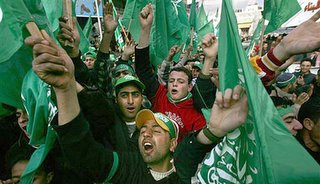The Dartmouth Observer |
|
|
Commentary on politics, history, culture, and literature by two Dartmouth graduates and their buddies
WHO WE ARE Chien Wen Kung graduated from Dartmouth College in 2004 and majored in History and English. He is currently a civil servant in Singapore. Someday, he hopes to pursue a PhD in History. John Stevenson graduated from Dartmouth College in 2005 with a BA in Government and War and Peace Studies. He is currently a PhD candidate in the Department of Political Science at the University of Chicago. He hopes to pursue a career in teaching and research. Kwame A. Holmes did not graduate from Dartmouth. However, after graduating from Florida A+M University in 2003, he began a doctorate in history at the University of Illinois--Urbana Champaign. Having moved to Chicago to write a dissertation on Black-Gay-Urban life in Washington D.C., he attached himself to the leg of John Stevenson and is thrilled to sporadically blog on the Dartmouth Observer. Feel free to email him comments, criticisms, spelling/grammar suggestions. BLOGS/WEBSITES WE READ The American Scene Arts & Letters Daily Agenda Gap Stephen Bainbridge Jack Balkin Becker and Posner Belgravia Dispatch Black Prof The Corner Demosthenes Daniel Drezner Five Rupees Free Dartmouth Galley Slaves Instapundit Mickey Kaus The Little Green Blog Left2Right Joe Malchow Josh Marshall OxBlog Bradford Plumer Political Theory Daily Info Andrew Samwick Right Reason Andrew Seal Andrew Sullivan Supreme Court Blog Tapped Tech Central Station UChicago Law Faculty Blog Volokh Conspiracy Washington Monthly Winds of Change Matthew Yglesias ARCHIVES BOOKS WE'RE READING CW's Books John's Books STUFF Site Feed |
Friday, January 27, 2006
Is Political Islam a Threat to America? If asked about a clash of civilizations, or about the religion of Islam, most policy makers would quickly note that Islam is a peaceful religion embraced by many moderate people seeking an expressive outlet for their faith. After that politically correct caveat, they would then indicate that the real threat to America, and the ideology that undergirds the transnational terrorist network, is something called "political Islam." It's too bad that "political Islam" is not an international menace. The webiste Family.org, which focuses on "social" issues, describes political Islam as a political movement whose goal is the "Islamization of the political order, which is tantamount to toppling existing regimes, with the implication of de-Westernization." The methods and technologies of Islamization can vary between groups; "Some groups advocate violent overthrow as the means of establishing an Islamic order, while others have advocated more peaceful, evolutionary change." Political Islam is also referred to as Islamic fundamentalism, Islamism, jihadism, and militant Islam.  Middle East specialist Daniel Pipes in 1995 specified the dangers of this movement from his point of view: Middle East specialist Daniel Pipes in 1995 specified the dangers of this movement from his point of view: Though anchored in religious creed, fundamentalist Islam is a radical utopian movement closer in spirit to other such movements (communism, fascism) than to traditional religion. By nature anti-democratic and aggressive, anti-Semitic and anti-Western, it has great plans. Indeed, spokesmen for fundamentalist Islam see their movement standing in direct competition to Western civilization and challenging it for global supremacy. Let's look at each of these elements in more detail. On Dan's reading, political Islam is a very dangerous thing. With thousands of years of traditions and symbols to draw upon, the mobolizing power of this ideology is large and should be feared. Moreover, in three major recent elections in the Middle East--Egypt, Iraq, and Palestine--political Islamists have come to power. Palestine and Iraq were the most crushing blows because the Iranian-backed Shiia alliance, and Hamas, an organization classified as terrorist by the United States, won those respective elections. The New York Times succinly captures Bush's dilemma: "The sweeping victory of Hamas in the Palestinian elections threw President Bush and his aides on the defensive on Thursday, complicating the administration's policy of trying to promote democracy as an antidote to the spread of terrorism." After the results from the Iraqi election appeared, sour analysts quickly scoffed: Democracy, however, is not the cure-all for everything. The country remains a security nightmare, with no end in sight to the insurgency. EDIT (next paragraph added recently): Law professor Stephen Bainbridge added his voice to the naysayers suggesting: "The GOP's foreign policy traditionally was dominated by realists and national interest types, who were deeply suspicious of nation building and the like. Bush ran on that platform but after 9/11 veered off into a Wilsonian program of promoting democracy in the Middle East. Now we see what an apparently fair election in Palestine leads to: a decisive victory by a terrorist organization hostile to both the US and Israel. And this is a good thing?" The issue of the results of the votes, however, should be disaggregated from the unproven danger that Islamism poses to America. The results of the elections suggest that even if the ideology of political Islam is not deeply internalized, Middle Eastern voters do not associate the Islamist parties with the corruption of the ruling regimes, and, are willing to vote them into power to target corruption. Voters signaling that they are unhappy with corruption should never trouble the democracy-enthusiasts in the White House. What most policy analyst fear is not that the Islamist will stem corruption, or, at the very least use the corruption to benefit someone else, but that Islamist-dominated regimes will have foreign policy preferences different from those of the United States. The grand strategy of the Bush administration rests on the twin ideas that (1) democracies generally pursue compatible sets of goods, and, (2) their foreign policy objectives will dovetail with the United States. Islamist parties threaten this naive view of how democracies interact in an international state system. Domestically, Islamic parties may impose or incentivize conformity to laws and codes that arise from an "Islamic" tradition. No more threatening to America's national security than if the Anglicans were to sieze power in the United Kingdom, the American voting public need fear nothing from the values of ruling elite insinuating connections to public character and religious belief systems while translating those beliefs into laws and policy. Internationally, Islamist states will face the same pressures as other states. If they act aggressively toward their neighbors, other states will balance against their threat. If they continue to participate in the international economy, investors will send capital their way if their domestic institutions are capital and market friendly. Most succintly, there is nothing particular to Islamist ideologies within states that poses a unique national security threat to the United States greater than that of any other ruling domestic coalition within a procedural democracy. Political Islam as a transnational movement does not present the United States with an existential national security threat either. Commentary after September 2001 understates the degree to which Islamist movements present domestic challenges to corrupt, decaying regimes within the Islamic world. The United States' security is implicated to the extent to which the present governing coalitions remain in power due to American support. The clash of civilizations would be better termed the clash within civilizations, and, is truly no different than the radical race-based movements that challenged legally and socially sanctioned racial hierarchy in American democracy during the 1960s and 1970s. Islamists movements, like the Muslim Brotherhood, primary aim has always been to achieve political power inside their countries and do away clientilistic regimes. Transformational diplomacy, toward the end of encouraging democratic forms of legitimation and domestic institutional structures designed to channel the will of the people, is the correct national security strategy. The slow transitions to voting in the Middle East that do not threaten the political power of the current regimes should fool no one. Rulers in the regions have been faking piety to the divine since Muhammed, just as the elite in Europe and America have faked devotion since the fall of Rome, and could probably similar fake affecting for voting without discovering democracy. Until the economies of the region begin to perform in perform in productive ways for a majority of their population, political Islam will always have a need to struggle against domestic domination. We should encourage this struggle. Political Islam is not a threat to American security; it's an opportunity for democratic values. |
